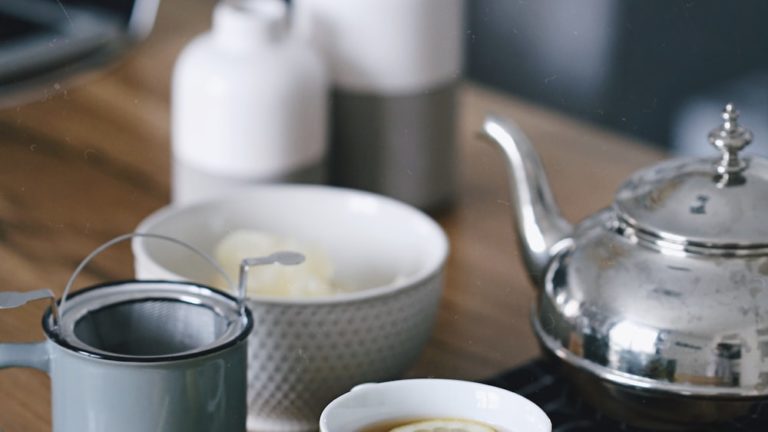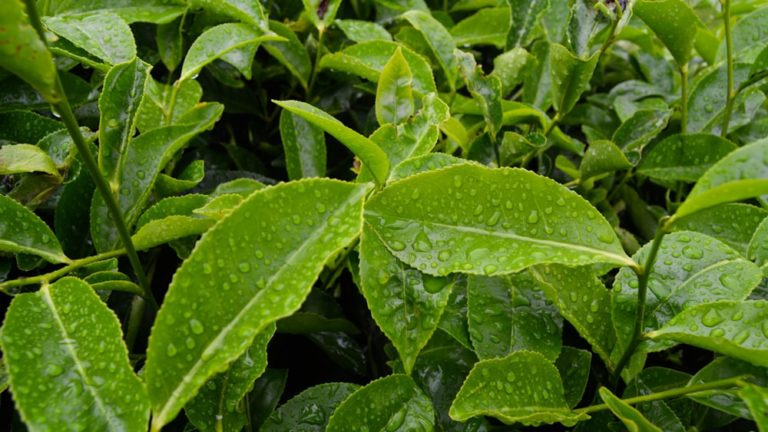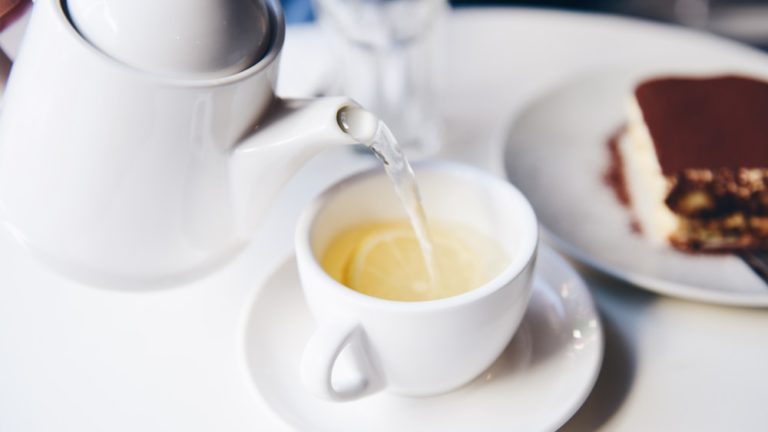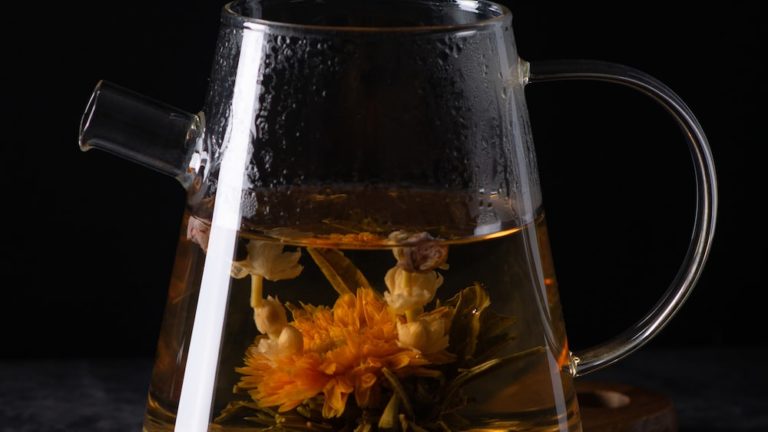Mugwort Tea: Discover The Benefits And Uses Of Mugworts Tea

Mugwort Tea: Discover The Benefits And Uses Of Mugworts Tea
Well, hello there, you beautiful tea enthusiast and esteemed health-conscious reader! Did you know that tucked away within the realm of herbal teas, there resides a mystical brew known as Mugwort tea? No, it’s not a new potion from Hogwarts (although, wouldn’t that be something?), but rather a therapeutic beverage with a distinguished lineage and potent health benefits.
Dive with me into the depths of the tea world where we’ll explore this brew not just from the, “Hmm, sounds interesting” perspective but from a, “Oh, I might actually integrate this into my life” kind of way. Is it a magic elixir or simply just a refreshing tea with potential health benefits? Well, let’s just say it’s a brew worth every sip, twitching with promises of wellness and fortifying your being.
Alright, let’s not dilly-dally any further. Fasten your teacups and hold on to your biscuits. We’re off!
Understanding Mugwort Tea
Mesmerized yet? Well, hold your high hats, because when it comes to mugwort tea, we are talking about a unique concoction that sits comfortably in its own class of wonderment. What, may you ask, is this drink that sounds like it was plucked straight from the pages of a fantasy novel? Let’s steep into the specifics.
What is Mugwort Tea?
When I say ‘mugwort,’ you might wonder if I’m channeling my inner Hemione Granger or brewing up a magic potion. Nope, my friend, mugwort is as real as the leaves on your favorite tree. This plant superhero, known scientifically as Artemisia vulgaris, is a perennial herb native to Asia, North Africa, and Europe. Its leaves, when dried and brewed, concoct what we know today as mugwort tea.
And boy! What a beverage it is! Our magical mugwort, often likened to the versed elder in the plant kingdom, offers us a herbal tea that is both soothing to the senses and brimming with health benefits. Considering a cup yet?
But wait, before that steamy first sip, let’s time travel a bit. Everything has a backstory, and our friend mugwort tea’s history is at least as riveting as a knight’s tale from King Arthur’s round table (well, almost!).
Mugwort tea is a real and magical herbal beverage with a fascinating history and numerous health benefits.
The History of Mugwort Tea
Long ago, before teabags held court and chai latte was the order of the day, mugwort was already a star. Our cosmic herb’s first recorded rendezvous with humanity traces back to the ancient Roman times when soldiers packed their boots with mugwort for long marches. Imagine that! It served as the unofficial foot spa of exhausted legionnaires!
Fast forward to medieval Europe, and mugwort found its place in both indigenous medicine and folklore as a magical herb that warded off evil spirits and diseases. Talk about multitasking! Now if that doesn’t make your cup of mugwort tea taste a bit like an exciting potboiler laced with mystery, we don’t know what will!
The Benefits of Mugwort Tea
Sip your way to wellness with the sip-tastic mugwort tea! From easing menstrual pain to rebalancing your mental health, this herbal tea comes riddled with a range of potential health benefits that could make it your cup of choice (plus, it has a certain magical ring to it, doesn’t it?).

How Mugwort Tea Aids Menstrual Pain
Contrary to generic over the counter pain relievers, the pain-busting prowess of mugwort tea is anything but ordinary. Studies provide evidence that our mystical brew can ease menstrual discomfort not unlike a well-trained conjurer easing a rabbit out of a top hat!
Sipping on mugwort tea during “that time of the month” could potentially work wonders by alleviating common menstrual ailments like cramps and irregular periods. Historical texts go so far as to state that ancient women even used mugwort as a remedy for ‘female disorders.’ How’s that for a tea turning the tides on abdominal agony?
The Role of Mugwort in Relieving Joint Pain
Ach, it seems our beloved mugwort has another ace up its sleeve! Studies suggest that it could potentially play a significant role in relieving joint pain. If you’ve ever battled the aftermath of a savage leg day at the gym or wrestled with arthritis, then mugwort tea might aid your weary joints.
Understanding how mugwort eases these pains is like unraveling the mysteries of a secret society. The tea brews up a dynamic duo of antioxidants and anti-inflammatory compounds that may help reduce inflammation, consequently reducing joint pain. Reflecting on this, it seems our humble mugwort tea is more like a knight in shining armor, riding to the rescue of our sore bodies. Ha-ha!
Digestive Benefits of Mugwort Tea
So far, mugwort has been nothing short of a hero. However, like any superhero worth their cape, mugwort refuses to rest on its laurels, continuing to whip out health benefits as if from a magician’s hat. It appears that aiding digestion is a part of the brew’s repertoire!
That’s right! Numerous studies suggest that mugwort tea can help soothe an upset stomach while jump-starting a sluggish digestive system. Now if only it could help us digest the fact that our favorite jeans are a bit tight after a weekend of indulging in too much pizza!
The science behind this digestive divination lies in the herbal tea’s potential to stimulate gastric juices and bile production, turning your body into a well-oiled digestive machine. And that, my friend, isn’t a bunch of hocus pocus but a science-backed potential benefit of sipping on this aromatic brew. So if your belly is bellowing and your gut is groaning, you know which teapot to turn to, don’t you?
Mugwort Tea and Mental Health
And just when you thought, this tea couldn’t possibly do more, voila – we plunge into the realm of the mind. Mugwort tea might just be the brew for you if you’re looking for an all-natural way to boost your mental health (I mean, who isn’t these days, right?).

Several trials suggest that regular consumption of mugwort tea could potentially heighten mental alertness, improve memory, and even reduce stress. I mean, if a cuppa joe took a personality test, it might just come out as ‘mugwort tea’ on a wellness scale!
This heralded herbal concoction might also have neuroprotective effects owing to its antioxidant properties, flying to the rescue like Superman saving Lois Lane from her daily dilemmas. Well, what’s a brew got to do to get a superhero cape around here, huh?
Mugwort Tea and Weight Loss
Mugwort tea and weight loss – you might think this is the latest fad in the world of weight management, huh? Ah, but all roots run deep! When sipped, mugwort tea not only helps you become best pals with your bathroom scale, but also brings in numerous other health benefits (We’ll get to that later, stay with me!). Drinking it involves the ingestion of low-calorie nutrition, aiding in weight management without compromising on the dietary requirements.
A plant native to Europe and Asia, Artemisia Vulgaris or as we lovingly call it, mugwort, is steeped in hot water to make your evening brew. It’s as practical as having your little green friend right in a teacup! Research has shown that mugwort tea naturally speeds up the metabolic rate and promotes fat oxidation. Yes, that means it gives your body a gentle nudge towards shedding those pesky extra pounds.
Just imagine – sitting in your cozy chair, sipping hot mugwort tea, and indirectly doing what most people pay hundreds for at the gym. Now isn’t that a delightful image? Not to mention, the wide range of organic mugwort tea availability makes it even easier for health enthusiasts to incorporate it into their routine.
Can Mugwort Tea Increase Bone Mineral Density?
Now here’s an ironic twist. Mugwort tea, while popularly known for its ‘lightening’ effect on your weight, might also be great for…increasing bone mineral density! Yes, you read that right – a weight loss beverage that’s also good for your bones.
This is where those chemicals Artemisia Vulgaris is packed with come into play. Various compounds found in mugwort tea are thought to contribute to the improvement of bone health. They do so by promoting the absorption of essential minerals such as calcium and phosphorous.
Now, it’s important to note that while there’s a degree of research supporting this, it mostly comes from animal-based studies. Human-based research is still relatively sparse in this area. Maybe it’s high time scientists swapped their lab coats for tea kettles instead, huh?
Mugwort tea, known for its weight loss effects, may also help increase bone density by promoting the absorption of essential minerals like calcium and phosphorous.
Potential Side Effects of Mugwort Tea
But just like a cup of hot tea that can bring comfort or a scalded tongue, mugwort tea too isn’t devoid of potential side effects. Before you prepare your brew, you should be aware of these caveats, because, as they say, knowledge is power (and safety!).
Understanding Mugwort Allergy
While mugwort tea is a mighty warrior when it comes to our health, there’s a flip side to this coin – mugwort allergies. And no, you can’t simply sneeze them away! For some individuals, even the slightest whiff of mugwort could lead to an allergic reaction. From skin rashes to severe sinus issues – it’s like kryptonite to the Superman that is your immune system!
But here’s the intriguing part – many people with mugwort allergies are unaware of their condition until they have their first encounter with the plant. So, before you set out to harvest your mugwort for a home-brewed cup of tea, double-check your allergy list.
Remember, it’s always better to err on the side of caution. After all, would you really want your tea-sipping experience to be akin to a sneeze-filled symphony? (Spoiler Alert: The answer is NO!)
Other Possible Side Effects
While an allergic reaction stands as the primary potential side effect of mugwort, it’s not the only thing to consider. Some individuals may experience gastric discomfort, changes in sleep patterns, or even on very rare occasions, hallucinations (No, we’re not recommending it for your next Led Zeppelin themed party!)

The herb doesn’t always play nicely with all medications, either. So, ensure you seek advice from healthcare professionals to prevent any unfortunate run-ins between your medicine cabinet and mugwort tea. Safety first, right?
How to Prepare Mugwort Tea
Getting ready to sip into the world of mugwort tea? It’s easy-peasy! You’ll just need some basic ingredients and a pinch of mugwort magic.
Steps to Make Mugwort Tea
- Choose your mugwort wisely. Opt for high-quality dried mugwort, preferably from a trusted organic source.
- Take about a spoonful of dried mugwort and put it into your teapot.
- Pour boiling water into the teapot, covering the mugwort.
- Steep for about 8 to 10 minutes. The longer you let it steep, the stronger the flavor. Be patient. It’s like that famous tea saying: Good things come to those who wait…and then strain.
- Strain your tea into your cup, and voila! Your very own mugwort tea is ready.
What Does Mugwort Tea Taste Like?
Now onto the million-dollar question: What does mugwort tea taste like? Surely it’s not just about its weight-loss and bone-strengthening capabilities without a touch of tantalizing taste. Well, brace yourself for we’re about to sail into the sea of taste!
Mugwort tea has a subtle, bitter-sweet flavor, which some people find reminiscent of sage or chrysanthemum. It’s also been compared to the aftertaste of green tea – slightly astringent, slightly woodsy. Funny how such a simple herb can arrest your taste buds in an impressive spectrum of flavors, huh?
And the aroma – oh, it’s a heady blend of earthy, pungent, and subtly sweet notes! It’s the kind of scent that makes you want to get cozy, sit back, inhale deeply, and say, “Ah, I’ve got this day in the bag!” Remember, the joy of sipping tea comes as much from its taste as from its aroma.
So, whether you’re a tea enthusiast searching for a new brew to discover or a health-conscious individual exploring wholesome additions to your routine, mugwort tea fits the bill quite nicely. With proper awareness and potential mild side effects kept in mind, it promises a tea experience quite like no other. Now, isn’t that something to look forward to your next cup?
Mugwort tea has a subtle, bitter-sweet flavor, reminiscent of sage or chrysanthemum, with a slightly astringent and woodsy aftertaste, making it a unique and enjoyable tea experience.
Where to Buy Mugwort Tea
Looking to purchase your very own stash of mugwort tea? You’re in luck! It’s not as elusive as finding a unicorn in the wild, nor is it as rare as a snowstorm in Africa. In fact, it’s as simple as a few mouse clicks, or even a leisurely stroll down to your local health food store.
Tips for Buying High-Quality Mugwort Tea
So, you’re ready to walk this tea trail, but how do you ensure you’re getting the good stuff? Firstly, remember the golden rule – not all teas are created equal! Pay close attention to the product details. Does it proudly flaunt it’s an all-natural, organic mugwort tea, or is it being suspiciously quiet on its origins? Is it a pure brew or a traitorously blended with other herbs?
Second tip on our list – remember to check the caffeine levels. If you enjoy a good night’s slip into dreamland, you know, the kind that rivals Sleeping Beauty’s sleep fest, you might want to opt for a brew with minimal caffeine levels. Reading reviews from other tea hobbyists also adds a dash of insight. Remember, when it comes to buying mugwort tea, discretion and vigilance are your trusty knights in shining armor.
Frequently Asked Questions
Is Mugwort Tea safe for everyone?
While mugwort tea is generally safe, it is best to consult your doctor before incorporating it into your wellness routine. This is particularly critical for those with pre-existing health issues, pregnant or lactating women, and individuals on medication.

How often can I drink Mugwort Tea?
How often you can indulge in mugwort tea depends largely on your individual tolerance and health state. Monitoring your body’s reaction to this herbal tea is always a smart move. Don’t hesitate to seek medical advice if in doubt.
Can I grow my own Mugwort for tea?
Yes, you definitely can grow your own mugwort. Doing so allows you to choose which parts of the plant end up in your tea cup. The joy of stepping into your garden and beckoning your very own bushel of mugwort is indeed, unparalleled!
Are there any known drug interactions with Mugwort Tea?
Mugwort tea does indeed interact with certain medications, particularly ones related to the liver. Ensure to consult your healthcare provider or a qualified herbalist before combining mugwort with any medications.
Conclusion
So, fellow tea enthusiast, we’ve walked the tea path, picked up nuggets of knowledge, and debunked the mystery shrouding mugwort tea. From its travel tales from the ancient East to its grand entry into Western teacups, we’ve explored its wings and fins.
The benefits of this humble brew encompass far more than health, creating a ripple that echoes in our wellbeing. Yes, it whispers in our ears, reminding us of nature’s power, whispering tales of the ancients, and fostering an unforeseen bond with Mother Earth.
Embrace this connection, invite mugwort tea into your havens, and let it become a part of your daily rituals. Remember, stay curious, stay enlightened, and explore the myriad wonders tea brings to your doorstep. Until our next tea adventure…
Yours in tea and tranquility, Zoe






